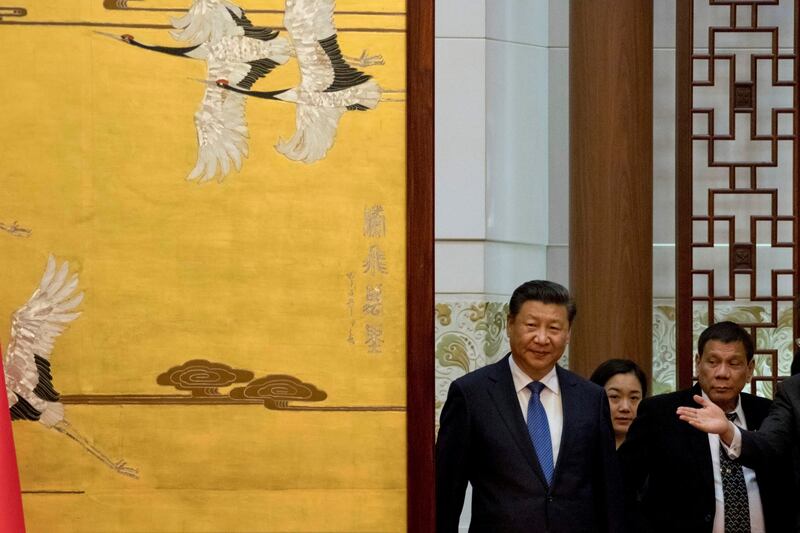The Philippine armed forces will seek to ensure the country has “unimpeded” access to natural resources within its waters in the South China Sea, Defense Secretary Gilberto Teodoro said this week as he signaled a more defiant strategy toward China.
In a major policy speech on Tuesday night, Teodoro spoke at length about his department’s “Comprehensive Archipelagic Defense” concept which, he said, aims to ensure that Filipinos will benefit from the exploitation of resources in the mineral-rich waterway. Transcripts of the speech at the Manila Overseas Press Club were only released Wednesday.
The implementation of the strategy will “guarantee as much as possible … unimpeded and peaceful exploration and exploitation of all natural resources” within the country’s exclusive economic zone (EEZ) for Philippine nationals, corporations, and others authorized by the Philippine government, he said.
“[W]e are evolving into a defense concept which projects our power into our areas where we must protect and preserve our resources,” Teodoro said.
China claims nearly all of the South China Sea, with the Philippines, Vietnam, Brunei, Malaysia and Taiwan having overlapping territorial claims. China lately has intensified its harassment of Philippine ships and boats in the West Philippine Sea, the name given by Filipinos to South China Sea waters within its EEZ.
Manila has been looking to tap resources in the potentially mineral- and gas-rich sea. During his time in office (2016-22), President Rodrigo Duterte pursued warm ties with Beijing.
In talks with his Chinese counterpart, Xi Jinping, he sought joint sea exploration activities with China. That angered Philippine nationalist groups, who protested against what they saw as Chinese encroachment to undersea natural riches that belong to the Filipino people.
Last January, the Philippine Supreme Court ruled as unconstitutional an exploration agreement between the Philippines, China and Vietnam because, it said, natural resources were reserved only for Filipinos.
“We are a small archipelagic country, the land mass is getting smaller, our population is getting bigger, our resource needs are exponentially increasing. These resources must be secured for the future generations,” Teodoro said in his speech on Tuesday.
“And if we do not stand up to the illegal and unilateral encroachment of these resources through a distorted nine- or ten-dash line, which nobody in the world accepts then we will be guilty of acquiescence and can be open to a rewriting of international law,” he said, referring to China’s own version of its territorial claims in the waterway.

Philippine laws, anchored in the United Nations Convention on the Law of the Sea (UNCLOS), should be respected by China, he added.
“That is the bottom line. We cannot meet halfway with China in that because it is forcing us, without our choice, to be its sole partner in developing those resources which rightly belong to Filipino citizens and their posterity; Rightly belong to them for them to exploit and explore with whomever they choose. This is not China’s property at all, the resources beneath the sea,” Teodoro said.
Officials at the Chinese embassy in Manila did not immediately respond on Wednesday to BenarNews requests for comment.
More alliances, joint activities
Another way for Manila to implement its new defense strategy is to pick up the pace of joint military activities with allies and partners, Teodoro said.
“We will increase the tempo of our activities with allies and other major partners not only in the West Philippine Sea but in other areas of the country,” he said. “We will exercise these partnerships to the full and it is within our unquestionable right to do so as a sovereign country.”
The Philippines has military pacts in place with the United States, its oldest defense ally, and with Australia. Manila is also in the “last stretch” of signing a Reciprocal Access Agreement with Japan to allow the exchange and training of the two countries’ military forces.
Earlier this month, the Philippines signed a separate memorandum of understanding (MOU) on defense cooperation with the United Kingdom and Canada.
“With other countries, the MOU list is growing. This will allow us to access on a government-to- government basis different capabilities,” the defense chief said.
These activities and commitments, he said, were based on a “common understanding” of a rules-based international order and the primacy of UNCLOS.
In July 2016, an international arbitration court in The Hague ruled against China and in favor of the Philippines, which had filed a lawsuit to challenge Beijing’s claims in the South China Sea. China, although a signatory to the UNCLOS, has refused to abide by the verdict.
